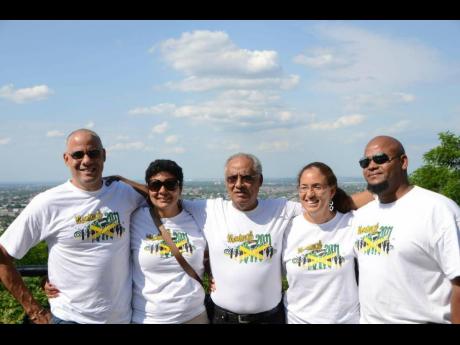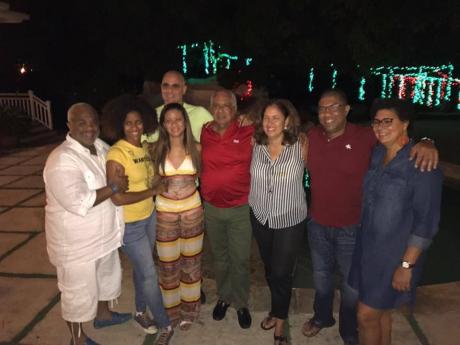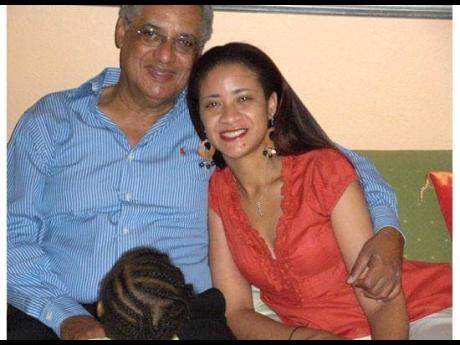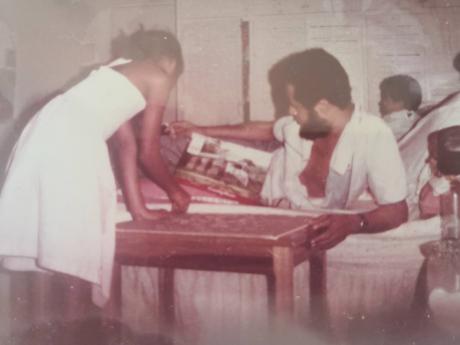‘A very funny kinda guy’ - DK’s children reflect on his love for country, family
Nevada Powe was in class at the Campion College when he was alerted that his mother was at the St Andrew-based high school to get him.
It was the 1970s and Powe’s mother, Grace Duncan, was married to Dr D.K. Duncan, the controversial and polarising politician who was fearless and relentless about pursuing his passion to reshape the politics of his country.
“I was like, ‘Oh my God! Something has happened’,” Powe recalled.
With his brother Sheldon Powe in tow, Grace Duncan had bags already packed for her two sons as well as their passports and cash, Powe remembered.
“They took us straight to the airport from school. I went to stay with an aunt in Miami, me and Sheldon,” he told The Sunday Gleaner.
D.K. Duncan, a dental surgeon trained at McGill University in Canada, quickly became a respected organiser and radical general in the People’s National Party (PNP), making him a lightning rod for controversy at the heights of the ideological struggles in the ‘70s.
And his family did not escape the impact of his political pursuits.
For Powe, being whisked from class in the middle of the day, in the middle of the school term was indicative of the dangers that lurked for the family.
“There was always a sense that we lived on the edge of some danger. It was not a regular occurrence, but it loomed large as a possibility,” he said, citing as an example the time in 1977 when Duncan was poisoned.
“That was a very scary time. I don’t believe we ever found out how it happened.”
He recounted, too, an incident in which gunshots were fired at his stepfather’s VW minibus while he and Sheldon were being transported home from school.
“I remember the car was being driven by Junior, who had driven the family for years, including D.K. … We were in the back playing and he said, ‘Get down on the ground’, and I remember grabbing Sheldon and pulling him on the ground,” Powe said.
The family, in a statement released on Friday, said Duncan left an indelible mark on the social fabric of the nation.
Fearless
“He was not afraid to challenge the status quo, speak his truth and stand for equality for all people. He was fearless in championing issues that affect the majority of Jamaicans that often feel they have no voice,” the statement said.
“D.K., husband, father, grandfather, great-grandfather, brother, uncle and our bona fide friend was a giant for us. He had a special relationship with his four brothers, as children of Pearly and HH. D.K. has left in all of us a legacy of commitment to social justice, integrity, passion for people, truth and love.”
Another challenge for his offspring was the fact that politics often took Duncan away from them for very long periods.
“He was the guy that wanted to make everybody happy, but he did not choose to spend a lot of time with us as children because he chose politics over family at that time,” said daughter Patricia Duncan Sutherland, acknowledging that it was a “difficult period” that caused some issues.
She is one of five siblings from the former PNP general secretary’s first marriage to Joan Duncan. The others are twins Keith and Donna, Marina (now deceased) and David.
“My father’s political work consumed him, which left limited time for family activities. As a teenager, when I wanted more of his time or greater interaction, I would join him on the political hustings. This was when I saw him at his authentic best,” Keith Duncan told The Sunday Gleaner.
Despite this, Duncan Sutherland remembers her father as “a very funny kinda guy”, who ensured they enjoyed their time together.
“Our weekends were like the most exciting … . When we went back to school and it was time to tell what happened on the weekend, we were like the cool kids on the block,” she said. “I was the yam and Marina was the dumpling in his soup.”
Changes
Duncan Sutherland said their relationship started to change after the PNP’s crushing defeat in the 1980 general election.
“Eventually, as the first set of children, we did get his attention, but that was when he had matured and learnt the value of being present,” said Duncan Sutherland.
“We had to do a lot of work together as father and children to repair our relationship and he ended his life with us having an excellent relationship as parent and child,” she added.
But amid the issues, Duncan Sutherland carried many cherished memories of her late father, who died at age 80 from complications caused by the coronavirus at the University Hospital of the West Indies last Thursday.
“Our family vacations, when we were all on his bed and we were chatting and telling a whole heapa stories. There are many, many good memories with him. I have zero regrets with my father,” said Duncan Sutherland.
Sheldon Powe came to know ‘Uncle D.K.’ as a seven-year-old after the popular political figure swept his mother off her feet.
Powe said he never felt like a stepchild.
“He showed love to all of us. I know he showed love to me. I never felt like how a stepchild supposed to feel like.
“When I was going to school and used to read a lot about him – some good things, some bad things – I didn’t even match the personality because the side I saw was always this person who wanted to spoil me,” he said describing their interactions.
But there was consensus among the siblings, during an interview with The Sunday Gleaner, that Imani was her father’s “wash belly”.
“He had a favourite; it was Imani,” Duncan Sutherland insisted.
Imani Duncan-Price admitted that she developed her appetite for Jamaican food “from tripe and beans to oxtail to liver from eating out my father’s plate every night”.
“He loved Jamaican food, well-seasoned with pepper,” she recounted.
It came as no surprise that she followed in his footsteps and entered representational politics.
But Duncan-Price sought to make it clear that she was influenced by both her parents, noting that her mother was also active in politics.
“Politics was not brought to the house by Daddy alone. They had a shared vision for the country. There were the conversations about inequality, Jamaica and the structure and how we can fix the system,” she said. “Service is in our DNA and I chose to pursue service in that way.”
In his final days, the veteran political strategist campaigned with Imani and Patricia to drum up support for them in the September 3 general election. Both women failed in their latest bid to emulate their father and take a seat in the Lower House.
D.K.’s sixth biological child remembers growing up in a house filled with love and her father’s strong devotion to family and his country.
She recalls, too, the time spent travelling the island with her famous father and listening sometimes as he engaged in spirited conversations with people from all walks of life.
“We go driving around and we see things and we just talked about how people lived, what can be different and what we can do. We would talk about Jamaica, about what’s wrong and what’s right,” she remembered.
Khia Josina Duncan, a medical doctor and the last of D.K.’s biological children, described her father as very loving and supportive.
“I was at the end of the whole ‘70s period so I had him more. I probably had him the most in terms of all the children because by then the PNP was out of power,” she said.
But by 1989, D.K. was back in representational politics, reigniting fears for his family.
“Knowing the history of Jamaica’s politics with guns and stuff, I was very worried. But he would still come home every night for dinner and we would watch shows on JBC (Jamaica Broadcasting Corporation),” she said.
Please see related stories on A10 and C11




